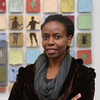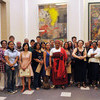Communities must use COVID-19 ‘chaos’ for change
30 June 2020 | Story Carla Bernardo. Read time 8 min.
“This is a necessary chaos. This is one of the most important chaotic periods we have as a species. It is the biggest opportunity for true decoloniality to occur.”
This is the view of Tauriq Jenkins on the COVID-19 pandemic, the impact of the crisis on communities, and the potential for change. Jenkins is an accredited South African Human Rights Commission (SAHRC) monitor, high commissioner of the Goringhaicona Khoi Khoin Indigenous Traditional Council, and the chair of the A/Xarra Restorative Justice Forum, which is based at the University of Cape Town’s (UCT) Centre for African Studies.

Jenkins was one of three panellists speaking about “community leadership in times of crisis”, the focus of the fourth conversation in the UCT Summer School’s “Unlocking COVID-19: Current realities, future opportunities?” series. The webinar series features conversations with leading authorities, UCT academics and alumni. This conversation, which took place on Wednesday, 24 June, was hosted by the UCT Klaus-Jürgen Bathe Leadership Programme, a scholarship programme that supports young future leaders at the university.
Joining Jenkins on the panel was Selam Kebede from Ethiopia and Nkosana Mazibiza from Zimbabwe. The moderator was Lorenzo Davids, the chief executive officer of the Community Chest who is pursuing his MPhil in Social Innovation at UCT’s Graduate School of Business.

For Jenkins, this “necessary chaos” must belong to communities; it is crucial that they are at the centre of the change-making and that the narrative is that of the poor and working class. He warned that the status quo will be concretised if communities do not latch onto the opportunities presented by the chaos.
“The world has changed and so it is up to us to determine how that change is going to happen,” he said.
Dangerous precedent
After nearly 100 days in lockdown, Jenkins reflected on how government, civil society and communities had fared. In particular, he reflected on his experience as a SAHRC monitor reporting on violations during lockdown and as a human rights activist in the Western Cape.
Jenkins said that while South Africa had enjoyed relatively few confirmed cases in the earlier stages, many knew that there was the potential for an explosive situation. This was because of exacerbating factors, such as apartheid spatial planning, poverty and communities in high-density areas battling with tuberculosis and HIV/AIDS crises, and various other comorbidities. For Jenkins, the question was how the government would respond.
On the government’s deployment of the military, Jenkins said there was “a conflation in terms of the interpretation of what is a national disaster to what was a state of emergency”. He said the deployment evoked the memory of an experience which the country has been trying to move away from since 1994. Added to this was concerning behaviour by law enforcement, which includes demolitions, evictions and the harassment of informal traders.

Furthermore, under Level 5 of the lockdown, civil society and watchdog organisations were unable to fulfil their mandates because, said Jenkins, “they literally could not get out of the front door” and were initially not granted essential permits. He said this had left a vacuum on the streets and set a dangerous precedent.
Fortunately, it was at this moment that Chapter 9 institutions, such as the SAHRC, entered into agreements with civil society, extending their Section 11 mandate to allow civil society to continue their work on the ground.
Most vulnerable
Jenkins said that while the COVID-19 pandemic has affected South Africa’s most vulnerable the worst, it is also the most vulnerable in communities who have taken agency and have advocated for themselves.
“Around the country you’ve seen civil society poignantly identifying incidents of oppression and actually mobilising a lot of support around that,” he said.
To illustrate a way in which communities had mobilised, Jenkins used the example of the City of Cape Town’s relocation of almost 2 000 homeless people to Strandfontein. As an SAHRC monitor, Jenkins witnessed numerous human rights violations at the camp and added that the City attempted to interdict the SAHRC with a “gag order, seemingly to silence reports” of these violations. Fortunately, through the mobilisation and work of civil society and community members, the camp was eventually closed. This, said Jenkins, was indicative of the community’s consciousness, which has centred around responsibility for protecting the most vulnerable in society.

Another example of community mobilisation during the lockdown has been the formation of broad-based coalitions that are focused on protecting the most vulnerable. These coalitions, he said, are aware that at risk is not only the spread of COVID-19 and the loss of lives, but also “the very fibre of who we are as South Africans in terms of how we relate to our human rights”. It is because of this that Jenkins believes that despite the restrictive and unnatural conditions of lockdown, there has been “an extraordinary sense of mobility”.
“There is an extraordinary sense of action, of duty that is being deployed all around the country … we have been able to mobilise virtually and get to know people and communities virtually and almost find each other again,” he said. “And so, one of the most powerful things that have come about [in] this crisis is a common language of what we need to protect.”
New normal
Concluding the webinar conversation, Jenkins called for absolute vigilance from civil society and communities.
“What we have to be very careful of is the fact that whatever the ‘new normal’ is now, it should absolutely not be the new normal for us as civil society,” he warned.
As the lockdown comes to an end, Jenkins called on civil society and communities to identify and unpack areas where political power had been asserted. He said it was crucial to do so because often when countries emerge from disasters, authorities tend to extend restrictions from abnormal conditions to a normal situation.
“History will tell us that we have to be concerned. We need to be sure that our analysis is good and that we hold power to account,” he said.
 This work is licensed under a Creative Commons Attribution-NoDerivatives 4.0 International License.
This work is licensed under a Creative Commons Attribution-NoDerivatives 4.0 International License.
Please view the republishing articles page for more information.
Centre for Higher Education Development
In the news


.jpg)
































































































































































































































